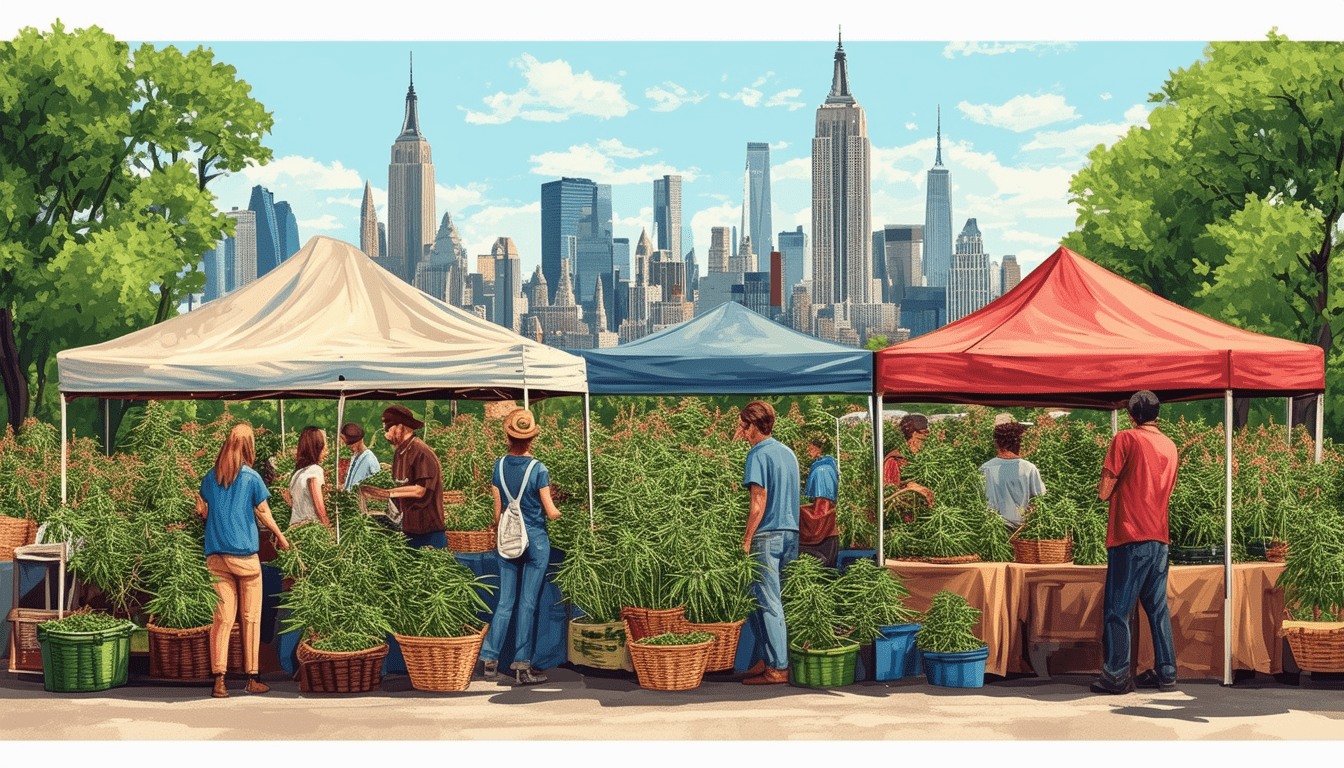New York Governor Approves Legislation to Reintroduce Marijuana Farmers Markets and Define Cannabis as an Agricultural Commodity
|
IN BRIEF
|
Recent legislative developments in New York have marked a significant shift in the state’s approach to the cannabis industry. Governor Kathy Hochul’s approval of two crucial bills aims to revive marijuana farmers markets and firmly categorize cannabis as an agricultural commodity. These measures are designed to bolster the legal marijuana market, alleviate challenges faced by local farmers, and ultimately enhance the economic viability of the newly established industry. By streamlining regulations and providing beneficial frameworks, New York positions itself as a leader in the growing cannabis sector, aiming for a robust future that supports both small-scale cultivators and consumers alike.

Introduction: New York’s Groundbreaking Cannabis Legislation
Recently, New York Governor Kathy Hochul signed significant legislation that revives the Cannabis Growers Showcase program and establishes cannabis as an agricultural commodity. These developments signify a monumental step towards enhancing the state’s legal cannabis market, thereby supporting local farmers and increasing consumer access to cannabis products. While the reinstated farmers markets aim to foster direct sales between providers and consumers, the new classification of cannabis will provide essential tax leniency, consolidating its status alongside other traditional crops.
Reintroduction of Marijuana Farmers Markets
The newly signed legislation allows for the permanent establishment of marijuana farmers markets, which enable cannabis producers to directly engage with consumers. These events not only facilitate transparency and product education but also help build brand recognition. The Cannabis Growers Showcase program, which was previously in operation, faced an untimely shutdown. Now, with this new approval, farmers will have pop-up markets lasting up to 14 days, allowing them to sell their products efficiently.
Supporting Local Farmers
Local lawmakers, such as Sen. Michelle Hinchey and Assemblymember Donna Lupardo, praised the legislation for its potential to alleviate the pressures faced by cannabis farmers. By providing avenues for direct sales, these markets can significantly reduce the risks and hurdles associated with a slow-moving retail rollout. Farmers will benefit from increased market opportunities, especially in regions where licensed dispensaries have yet to open. In a practical sense, this legislation aims to revive and strengthen local agricultural practices.
Defining Cannabis as an Agricultural Crop
With cannabis now officially categorized as an agricultural crop, the legislation provides critical clarity around tax assessments and zoning rules. This effective reclassification mitigates any potential risks that cannabis farmers might face regarding loss of agricultural tax assessments. Farmers transitioning from traditional crops to cannabis will benefit from lower tax rates, equating the treatment of cannabis to other crops like grains or hops.
Impact on Tax Structures
Normally, agricultural assessments afford landowners reduced tax rates depending on their agricultural use. The new legislation aligns cannabis with this framework, ensuring legal growers are not financially penalized during their transition from other crops. By incorporating cannabis into the existing agricultural classification, farmers will have an added layer of financial protection, allowing them to focus on production without the looming concern of increased property taxes.
Challenges and Setbacks
Despite these advancements, Governor Hochul vetoed an additional proposal that aimed to modify the frequency of excise tax payments for cannabis businesses, which would have allowed annual payments instead of quarterly ones. Stakeholders argued that changing the payment dynamics would improve cash flow and provide better financial management opportunities as the market continues to expand. However, Hochul’s dismissal indicates persistent challenges for cannabis operators within a framework still adapting to recent regulatory changes.
The Need for Legislative Support
Businesses are under consistent strain due to the slow establishment of retail operations. According to industry advocates, many legal cannabis products are accumulating excessive taxes prior to point-of-sale. Legislative members and trade organizations continue to express urgency for supportive measures that cope with current financial burdens, as farmers and processors await more accessible retail avenues.
The Watchful Eye on Market Growth
As New York anticipates surpassing $1 billion in cannabis sales by the end of the year, there are key operational initiatives in place to address illicit market concerns. State officials continue rigorous enforcement policies targeting unlicensed cannabis shops, which have historically presented a significant threat to the region’s economic sustainability. The enhanced measures against these operators appear to be yielding positive outcomes, leading to increased sales in legitimate retail environments.
The Community Perspective
Despite ongoing critiques regarding the slow rollout and subsequent challenges, community feedback emphasizes the importance of legislative efforts that include all stakeholders in the cannabis industry. As New York’s cannabis market evolves, the focus must remain on promoting equity while ensuring that local farmers receive the support they need to thrive. The revival of farmers markets should not only serve economic interests but also reinforce community ties by connecting consumers directly to producers, facilitating mutual understanding and collaboration.
Looking Forward: The Future of Cannabis in New York
The recent legislative moves portray a strong commitment to fostering a thriving legal cannabis sector that aligns with traditional farming paradigms. As more markets open, and with continued advocacy for supportive policies, New York may well stand at the forefront of a significant agricultural evolution. Engaging further with consumers and enhancing the bond between farmers and the community will ultimately define the future trajectory of cannabis legislation in the Empire State.
For insights on clinical trials related to cannabis or to learn about the innovative cannabis products, it’s essential to stay informed as regulations and research continue evolving. Moreover, with an ongoing dialogue regarding the implications of cannabis rescheduling, as outlined in current updates, proactive engagement remains crucial.
Comparison of Cannabis Legislation in New York
| Aspect | Details |
| Legislation Type | Reintroduction of Marijuana Farmers Markets and Enhanced Classification |
| Impact on Farmers | Facilitates direct sales and reduces barriers for farmers |
| Cannabis Classification | Recognized as an agricultural commodity |
| Tax Benefits | Allows for agricultural tax assessments |
| Market Access | Pop-up events increase product visibility |
| Licensing Authority | Office of Cannabis Management (OCM) |
| Event Duration | Permits valid for up to 14 days |
| Legislative Support | Strong backing from key legislators |
| Consumer Education | Encourages interaction between farmers and consumers |

In a significant step forward for the cannabis industry, New York Governor Kathy Hochul has recently signed two critical bills into law, aimed at revitalizing the state’s marijuana market. These laws not only reinstate the Cannabis Growers Showcase program, which allows producers to sell their products directly to consumers at farmers market-style events, but they also clarify that cannabis will be officially classified as an agricultural crop.
Reviving the Cannabis Growers Showcase Program
The legislation reactivates the Cannabis Growers Showcase program, a vital initiative that enables cannabis cultivators to engage directly with consumers at designated events. This program had previously struggled amidst regulatory delays and a hesitant market. With the resumption of these showcases, cannabis farmers will have an immediate opportunity to boost their sales and foster stronger connections with consumers. These events not only aim to enhance access to legal cannabis products but also provide a much-needed outlet for farmers to offload their inventory in a climate where retail spaces have been slow to open.
Defining Cannabis as an Agricultural Crop
Perhaps one of the most pivotal aspects of the new legislation is the explicit classification of cannabis as an agricultural crop. This designation is crucial, as it allows cannabis farmers to benefit from agricultural tax assessments, potentially leading to lower tax rates. Such provisions will provide essential financial relief previously afforded to farmers of other traditional crops, leveling the playing field for cannabis growers. By recognizing cannabis alongside other agricultural products like grapes and barley, New York is taking a positive step in legitimizing the cannabis market and supporting its growth.
Support From Legislative Leaders
The approval of these bills has garnered enthusiastic support from legislative leaders. They highlight the importance of creating sustainable business opportunities for New York’s cannabis farmers. According to Senator Michelle Hinchey, chair of the Senate Agriculture Committee, these new laws will help to alleviate unnecessary hurdles for those “stepping up to build our cannabis industry” and will empower small-scale farmers to thrive in the expanding market.
Impact on the Local Economy
As the cannabis industry is expected to exceed $1 billion in sales by the end of the year, the new legislation might signify a turning point for local economies as well. By promoting the direct sale of cannabis at farmers’ markets and acknowledging its status as an agricultural product, the state enhances its potential to create jobs, foster innovation, and drive economic growth in an industry that has faced significant challenges since legalization.
What Lies Ahead
While these developments signal hope for cannabis farmers and businesses, challenges remain. Governor Hochul’s recent veto of a proposal to allow annual tax payment options for marijuana businesses indicates that legislative work is far from complete. As the market continues to evolve, stakeholders in the cannabis sector, including farmers, processors, and retail operators, will need to engage actively with lawmakers to address ongoing operational and financial hurdles.
For those involved or interested in the cannabis industry, the recent changes in New York serve as a compelling case study of how legislative action can directly influence market dynamics and agricultural practices. To navigate the complexities of cannabis cultivation and manage the unique challenges facing the industry, resources like soil health best practices and organic cultivation techniques may be beneficial for farmers looking to optimize their operations and contribute to a thriving local economy.
Key Points on New York’s Cannabis Legislation
- Governor Kathy Hochul signs two cannabis-related bills.
- Reintroduction of Cannabis Growers Showcase Program allows direct sales at farmer’s market-style events.
- Cannabis classified as an Agricultural Crop ensures farmers maintain tax assessments.
- Two laws praised for providing opportunities for local growers.
- Clarification on agricultural policies mitigates local tax assessment uncertainties.
- Cannabis Showcase Events approved to support small-scale markets.
- Sales permits granted for events lasting up to 14 days.
- Previous law sunsetted on January 1, 2024, making new legislation crucial.
- Legislation aims to bolster cannabis market amid slow retail rollout.
- Tax bill vetoed that would provide annual tax payments for cannabis businesses.
New York’s recent legislative advancements have taken significant steps in the cannabis industry by approving bills to reintroduce marijuana farmers markets and formally categorizing cannabis as an agricultural commodity. The new regulations, signed into law by Governor Kathy Hochul, aim to bolster local economies, support cannabis farmers, and enhance the legal market for such products. These developments reflect a growing recognition of the implications of cannabis within the agricultural sector and will better position New York’s farmers in this evolving market landscape.
Support for Local Cannabis Farmers
The revival of marijuana farmers markets is essential for small-scale producers who often struggle to compete with larger corporations. By allowing these markets to operate, local growers can directly engage with consumers, enhancing customer relationships and fostering a sense of community around the cannabis culture.
The new law facilitates Cannabis Showcase Events where cultivators and processors can sell their products directly to the public. Such initiatives not only promote local goods but also help to alleviate the backlog of products waiting for retail openings, stabilizing cash flow for farmers. This approach offers eco-conscious consumers the chance to access fresh, quality cannabis products while supporting local economies.
Clarification of Agricultural Status
The designation of cannabis as an agricultural crop in New York will streamline regulations regarding zoning laws and tax assessments. Previously, ambiguity surrounding the legal status of cannabis led to inconsistencies among local jurisdictions. By clearly defining cannabis within the agricultural framework, farmers can now take advantage of agricultural tax assessments, ensuring lower rates compared to commercial property.
This classification aligns cannabis alongside other established crops like grapes and barley, providing farmers with standard protections and benefits typically reserved for traditional agriculture. The legislative change is crucial in mitigating potential tax increases that could result from converting land to cannabis cultivation, thereby encouraging more farmers to enter the market without fear of financial repercussions.
Encouraging Economic Growth
With the anticipated explosion of New York’s cannabis market, projected to exceed one billion dollars in sales, these legislative changes can help stimulate greater economic activity. By alleviating unnecessary bureaucratic hurdles, the legislature enables farmers to focus on cultivation and innovation. Facilitating more accessible avenues for sales will create job opportunities and strengthen the entire supply chain.
Moreover, the measures support the state’s broader economic strategy by establishing the framework necessary for sustained growth within the cannabis sector. Lowering barriers to entry for smallholders ensures a competitive landscape in which diverse growers can thrive while attracting additional investment toward New York’s burgeoning cannabis market.
Balancing Regulation and Support
While the newly signed bills significantly benefit the cannabis industry, there is a pressing need to ensure regulations strike a balance between support and compliance. For example, Governor Hochul’s veto of a separate proposal regarding tax payment schedules indicates an ongoing challenge for cannabis businesses. Allowing an annual tax payment option similar to the alcohol sector could create substantial financial relief for growers and processors struggling with cash flow.
Continuous dialogue between lawmakers and industry stakeholders will be crucial in crafting regulations that adapt to the evolving needs of farmers and businesses. Ensuring that cannabis legislation remains flexible and responsive will foster an environment where innovation can flourish alongside compliance.
FAQ: New York’s Cannabis Legislation
What new legislation did Governor Kathy Hochul sign related to cannabis? Governor Kathy Hochul signed two bills into law, one to revive the Cannabis Growers Showcase program and another that classifies cannabis as an agricultural crop in New York.
What is the Cannabis Growers Showcase program? The program allows cannabis producers to sell their products directly to consumers at farmers market-style events.
Why was there a need to revive the Cannabis Showcase program? New York has faced challenges in opening retail shops following cannabis legalization, and the showcases are intended to provide immediate access to legal products for consumers while supporting farmers and manufacturers.
How long will the event permits for the showcases be valid? The event permits under the new law will be valid for up to 14 days.
What does the agricultural bill clarify regarding cannabis? The agricultural bill clearly defines cannabis as an agricultural product, ensuring that cannabis farmers can maintain their agricultural tax assessments and avoid potential tax increases.
How will classifying cannabis as an agricultural crop affect farmers? This classification allows cannabis farmers to benefit from lower tax rates on their land, similar to traditional agricultural crops, preventing sudden tax increases due to zoning rule ambiguities.
Was there any other legislation proposed that Governor Hochul vetoed? Yes, Hochul vetoed a bill that would have allowed marijuana businesses to pay excise taxes annually instead of quarterly.
How have legislative leaders responded to the new laws? Legislative leaders praised the new laws, stating that they will create lasting business opportunities for New York’s cannabis growers and provide financial relief similar to that given to other farmers.
What challenges have New York’s cannabis farmers faced recently? Farmers have faced difficulties due to a slow rollout of the adult-use cannabis market, resulting in financial strains and backlogs of products awaiting sale.
What impact could these new laws have on the financial health of cannabis businesses? The revival of the Cannabis Showcase program is expected to provide financial opportunities for smaller farmers and support their market integration as retail shops continue to open.





Post Comment